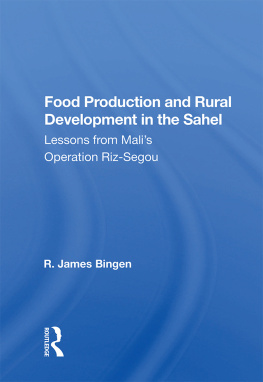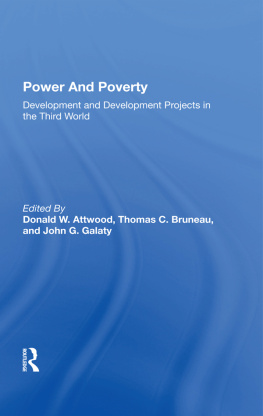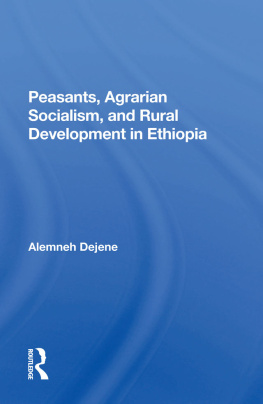INTERNATIONAL BANKING AND RURAL DEVELOPMENT
The Making of Modern Africa
Series Editors: Abebe Zegeye and John Higginson
From Self-Help Housing to Sustainable Settlement
John Tait
Ominous Transition
Joye Bowman
Contemporary Issues in Regional Development Policy
Edited by Wilbert Gooneratne and Robert Obudho
Oil and Fiscal Federalism in Nigeria
Augustine A. Ikein and Comfort Briggs-Anigboh
Religious Militancy and Self-Assertion
Islam in modern Nigeria
Toy in Falola and Matthew Hassan Kukah
An Aristocracy in Political Crisis
The end of indirect rule and the emergence of party politics in the emirates of Northern Nigeria
Alhaji Mahmood Yakubu
The Golden Contradiction
A Marxist theory of Gold
Farouk Stemmet
Beyond the New Orthodoxy
Africa's debt and development crises in retrospect
Nikoi Kote-Nikoi
The State, Violence and Development
Mark Chingono
International Banking and Rural Development
The World Bank in Sub-Saharan Africa
Pade Badru
University of Louisville
First published 1998 by Ashgate Publishing
Reissued 2018 by Routledge
2 Park Square, Milton Park, Abingdon, Oxon, OX14 4RN
711 Third Avenue, New York, NY 10017, USA
Routledge is an imprint of the Taylor & Francis Group, an informa business
Copyright Pade Badru 1998
All rights reserved. No part of this book may be reprinted or reproduced or utilised in any form or by any electronic, mechanical, or other means, now known or hereafter invented, including photocopying and recording, or in any information storage or retrieval system, without permission in writing from the publishers.
Notice:
Product or corporate names may be trademarks or registered trademarks, and are used only for identification and explanation without intent to infringe.
Publishers Note
The publisher has gone to great lengths to ensure the quality of this reprint but points out that some imperfections in the original copies may be apparent.
Disclaimer
The publisher has made every effort to trace copyright holders and welcomes correspondence from those they have been unable to contact.
A Library of Congress record exists under LC control number: 97076937
ISBN 13: 978-1-138-31431-3 (hbk)
ISBN 13: 978-0-429-45703-6 (ebk)
I would like to thank, first of all, all the faculty and staff members of the department of sociology' at the State University of New York at Stony Brook, without whose cooperation and friendliness during my four years in the department, this work would not have been possible. I would also like to extend my gratitude and appreciation to all the members of my dissertation committee, whose constant criticisms gave me all the courage and inspiration needed to produce this work. My special thanks go to my advisor, an outstanding sociologist and African scholar, Dr. Brace Hare, whose constant words of encouragement saw me through the most difficult time while writing this dissertation. My thanks also go to Drs. Richard Williams, Mary Vogel, Paget Henry and Ian Roxborough, all of whom, in their different styles and ways, contributed enormously to improving the quality of this work. I would also like to express my thanks to my colleagues in the department of Pan African Studies, University of Louisville, Louisville, Kentucky, for their support of my work. I am also grateful to the office of the Dean of Arts and Sciences, University of Louisville, for making available to me a mini-grant towards the preparation of this book. Finally, I would like to thank Ms. Wanda Olivera, the secretary to the Graduate programme in sociology at the State Uinversity of New York-Stony Brook for the time she took in typing the original manuscript.
Of course, I alone am responsible for all the empirical and conceptual faults and errors contained in this book.
- ADP Agricultural Development Project
- EEC European Economic Commission
- ECLA Economic Commission for Africa
- FFB Fresh Food Bunches
- GR Green Revolution
- IITA Institute for Tropical Agriculture
- IMF International Monetary Fund
- IRBD International Bank for Reconstructing and Development
- IRDP Integrated Rural Development
- NAFAPP National Food Acceleration Programme
- Naira Nigerian Currency
- OFN Operation Feed the Nation
- RISADEP Rivers State Rural Development Project
- RISONPALM Rivers State Palm Oil Development Corporation
- SAP Structural Adjustment Programme
- SPO Special Palm Oil
- UNDP United Nations Development Programme
- UNO United nations
- U.S.$ United States of America's dollar
- WB World Bank
The World Bank involvement in Third World development can be traced back to the early fifties when the bank officially became an instrument of global capitalist development. The establishment of the bank, and its sister institution, the International Monetary Fund (IMF), represented a crucial realignment of forces within the world capitalist economy at the time with the United States replacing the global hegemony of the British imperial state. The rise of the United States as a major economic, political, and military power after the war, thus set the stage for the ideological battle against the spread of communism worldwide. The cold war, as this era was popularly known, pitched the capitalist west against Soviet and eastern block communism with the Third World caught in the middle of ideological battles between the two superpowers.
In order to reduce the attraction of communism as an option of social, political, economic development for poor countries in the developing world, and war ravaged Europe and Japan, the establishment of a capitalist institution that would promote capitalist development worldwide became the preoccupation of the United States and its European allies. The spread of Soviet communism into eastern Europe, and the sudden rise of the Soviet Union as a major superpower after the end of the war, clearly posed a big threat to traditional European interests in the former colonies and dependencies. Thus, by promoting a vigorous capitalist transformation of agriculture in the developing world in addition to some limited capitalist development in industry and commerce, the western powers believed it would be able to discourage the new states in Africa, and elsewhere in Asia, and Latin American from joining the communist block. It is against this background that we situate our analysis of the World Bank's changing strategies in the development process of many Third World countries.
The International Bank for Reconstruction and Development (IRDB), otherwise known as the World Bank, is by no doubt the single most powerful instrument of global capitalist development. It is indeed die largest single source of development resources in a world divided by extremes of riches and poverty. As a pillar of global capitalist world domination, the bank continues to play the role of an intermediary between the developed western metropolis section of the global economy and its poorest parts in the peripheries of Africa, Latin America and of southeast Asia. Playing the role of an intermediary evidently demands that the bank maintains the existing relations of production, technology control, investment, exchange, and the economic advantage of the developed world globally.






